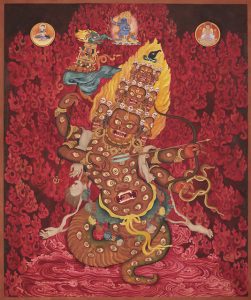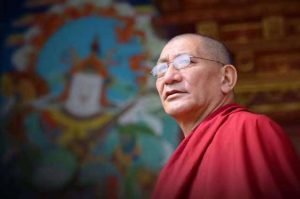In September, I attended an inspiring three-day talk between the founder of Mindfulness-Based Stress Reduction (MBSR) Jon Kabat-Zinn, and Lion’s Roar editor Melvin McLeod. The conversation was live-streamed on 20—22 September, and registration was free, with both men agreeing that their aim was to make mindfulness teachings widely accessible. It was a fascinating weekend and I felt privileged to hear Kabat-Zinn talk in such depth and under what felt like very intimate circumstances; witnessing the office space of one of one’s heroes is quite an experience!

And clearly I was not the only fan. McLeod praised Kabat-Zinn for his historic contribution in “creating a genuine contemplative and meditative movement on American soil.” He highlighted that Kabat-Zinn is acknowledged as the original founder of the mindfulness movement—also known as the mindfulness universe—having initiated the MBSR center (formally the Stress Reduction Clinic) in 1979. They both covered a number of topics, which included interesting anecdotes around Kabat-Zinn’s “origin story” and his professional trajectory, the history and future of the mindfulness universe, the relationship between Buddhism and the American-born mindfulness movement, and the proven benefits of mindfulness for individuals and the collective.
It is worth noting that McLeod did not shy away from pressing Kabat-Zinn on some contested matters, such as Kabat-Zinn’s strategic decision to divorce the mindfulness movement from Buddhist doctrine. This has also been a common critique among Buddhists. In my opinion, Kabat-Zinn provided strong arguments for his decision, which included the limitations and time constraints of what is essentially an eight-week course, as well as the culturally transcending power of mindfulness. Another moment that sparked lively discussion arose around the definition of mindfulness. It quickly became apparent that the concept is elusive, even to someone who has been teaching it for decades and is at the forefront of the movement.

Kabat-Zinn humorously quoted one of his teachers, Korean Zen Master Seung Sahn (1927—2004): “Open your mouth and you’re wrong.” The real Dharma, he highlighted, is beyond the very idea of Dharma and therefore it is beyond words. Hearing this was music to my ears. As a mindfulness practitioner, I often have difficulty describing this complex term and now I realize that this is only natural: mindfulness is something to be experienced rather than explained with a fancy vocabulary.
That said, Kabat-Zinn helpfully provided a few working definitions and sentences that he conceded were imperfect but could point us in the right direction: mindfulness is “the awareness that arises from paying attention on purpose in the present moment, non-judgmentally.” Mindfulness practice is “a way of accessing our own unique genius, beauty, buddha-nature,” as well as “a love affair with the present moment.” Meditation is “tuning in to the actuality of the present moment.”
Kabat-Zinn also used the term “embodied,” highlighting that many of us become so carried away in our heads that we have to be reminded that we are embodied. This resonated with me; whenever I seek out a new mindfulness or meditation teacher, the first thing I look at is how they carry themselves. This usually provides the best clues as to whether they are committed to a genuine practice.

As for Kabat-Zinn, it certainly seems that he practices what he preaches! His calm demeanor throughout the three days was contagious. And he regularly paused before answering—closing his eyes and checking in with himself, evidently choosing to respond from a place of being anchored in his body and the present moment, rather than simply reacting. McLeod echoed this observation at the end of the series. He shared that in his professional role he has the privilege of meeting many Dharma teachers, and Kabat-Zinn is clearly a good one.
Fittingly, Kabat-Zinn downplayed the significance of rigorously adhering to the MBSR program. He explained that while MBSR tools can support mindfulness teachers, what is more important is that they “teach out of their own meditation practice.” Similarly, students are not bound by their teachers but by their own scientific enquiry into the present moment. The curriculum is not to be perfect or enlightened, quite the opposite: over time, mindfulness practice shows us how “to be at home in one’s skin, even within the full catastrophe of the human condition.” This does not mean passively accepting everything, but it does mean feeling all the feelings and acknowledging “the good, the bad, and the ugly” about ourselves and the world.
Asked about the benefits of mindfulness on the collective, Kabat-Zinn explained that developing pure awareness enables us to gain a glimpse into the interconnected nature of everything. Mindfulness is therefore “much bigger than my particular pain in my knees or in my heart.” And this way of being is more important now than ever, amid the suffering and isolation caused by the deterioration of the environment and technological advancements. The world is literally “dying” for more mindfulness.
While the stakes are incredibly high, Kabat-Zinn remains optimistic. He is inspired by all the different iterations that the mindfulness movement is taking as it emerges from and adapts to diverse cultural, social, and ethnic communities. Pointing to the fact that he and McLeod are both older, white men, he highlighted the importance that the mindfulness universe should be co-created by people from all walks of life in order to truly reflect and foster interconnection. The MBSR founder emphaszied that the present moment is full of possibilities.
Nina Müller is a mindfulness practitioner who offers online mindfulness coaching sessions. If you would like to find out more, please visit The Mindful Practice to book a complimentary consultation.
See more
Jon Kabat-Zinn Brings Mindfulness to Life













